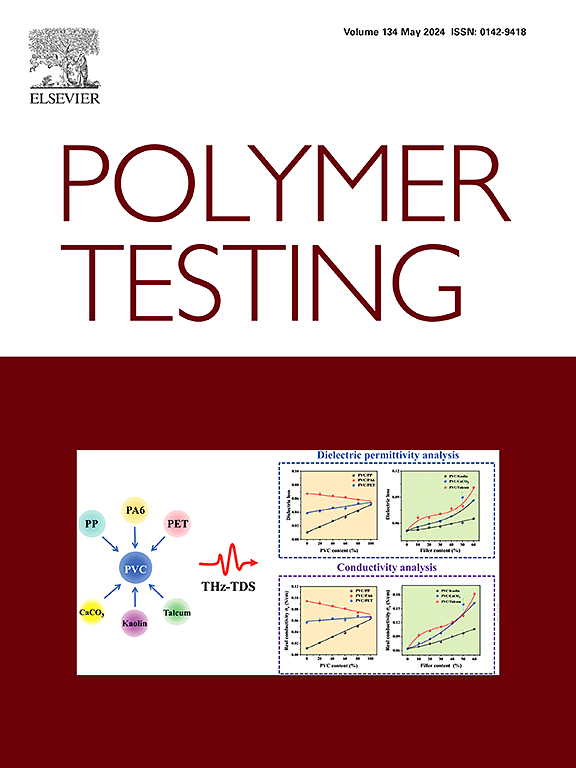无溶剂合成生物基非异氰酸酯聚氨酯 (NIPU),具有良好的粘合性和耐低温性
IF 5
2区 材料科学
Q1 MATERIALS SCIENCE, CHARACTERIZATION & TESTING
引用次数: 0
摘要
非异氰酸酯聚氨酯(NIPU)粘合剂代表了粘合剂技术的尖端进步,有望显著减少行业内对异氰酸酯基聚氨酯的依赖。随着石油资源的日益稀缺和可持续环境实践的日益迫切,追求全面可持续的生物衍生非异氰酸酯聚氨酯(NIPU)粘合剂已迅速成为科学研究界关注的一个关键领域。本研究通过腰果酚缩水甘油醚(602A)与二氧化碳(CO2)的加成聚合工艺合成了腰果酚环碳酸酯(CPCC),然后利用从生物质油中提取的二胺进行固化,在常温下生产出生物基 NIPU。合成的 NIPU 粘合剂具有显著的热稳定性,对各种基底材料的粘附性也非常出色。值得注意的是,这种粘合剂在超低温条件下显示出卓越的粘合功效,在-37°C时钢材粘合强度高达7.78兆帕。本研究提出了一种高效、快速制备生物基 NIPU 的合成方法,为该领域做出了重要贡献。此外,它还为未来 NIPU 粘合剂技术的发展提供了宝贵的参考,特别是对于需要在低温环境下进行强力粘接的应用。本文章由计算机程序翻译,如有差异,请以英文原文为准。
Solvent-free synthesis of bio-based non-isocyanate polyurethane (NIPU) with robust adhesive property and resistance to low temperature
Non-isocyanate polyurethane (NIPU) adhesives represent a cutting-edge advancement in adhesive technology, poised to significantly diminish the dependency on isocyanate-based PU within the industry. In the context of the increasing scarcity of petroleum-based resources and the growing imperative for sustainable environmental practices, the pursuit of a comprehensively sustainable, bio-derived non-isocyanate polyurethane (NIPU) adhesive has swiftly become a pivotal area of interest within the scientific research community. In this study, the cashew phenol cyclic carbonate (CPCC) was synthesized through the addition polymerization process involving cashew phenol glycidyl ether (602A) with carbon dioxide (CO2), followed by a curing step utilizing a diamine extracted from biomass-derived oils to produce bio-based NIPU at ambient temperature. The synthesized NIPU adhesive demonstrated remarkable thermal stability and exceptional adhesion to a variety of substrate materials. Notably, the adhesive showcased superior bonding efficacy at ultra-low temperatures, with steel bonding strength reaching up to 7.78 MPa at -37°C. This study presents an efficient and accelerated synthesis approach for the preparation of bio-based NIPU, offering a significant contribution to the field. Moreover, it provides a valuable reference for future advancements in NIPU adhesive technology, particularly for applications requiring robust bonding at low-temperature environments.
求助全文
通过发布文献求助,成功后即可免费获取论文全文。
去求助
来源期刊

Polymer Testing
工程技术-材料科学:表征与测试
CiteScore
10.70
自引率
5.90%
发文量
328
审稿时长
44 days
期刊介绍:
Polymer Testing focuses on the testing, analysis and characterization of polymer materials, including both synthetic and natural or biobased polymers. Novel testing methods and the testing of novel polymeric materials in bulk, solution and dispersion is covered. In addition, we welcome the submission of the testing of polymeric materials for a wide range of applications and industrial products as well as nanoscale characterization.
The scope includes but is not limited to the following main topics:
Novel testing methods and Chemical analysis
• mechanical, thermal, electrical, chemical, imaging, spectroscopy, scattering and rheology
Physical properties and behaviour of novel polymer systems
• nanoscale properties, morphology, transport properties
Degradation and recycling of polymeric materials when combined with novel testing or characterization methods
• degradation, biodegradation, ageing and fire retardancy
Modelling and Simulation work will be only considered when it is linked to new or previously published experimental results.
 求助内容:
求助内容: 应助结果提醒方式:
应助结果提醒方式:


